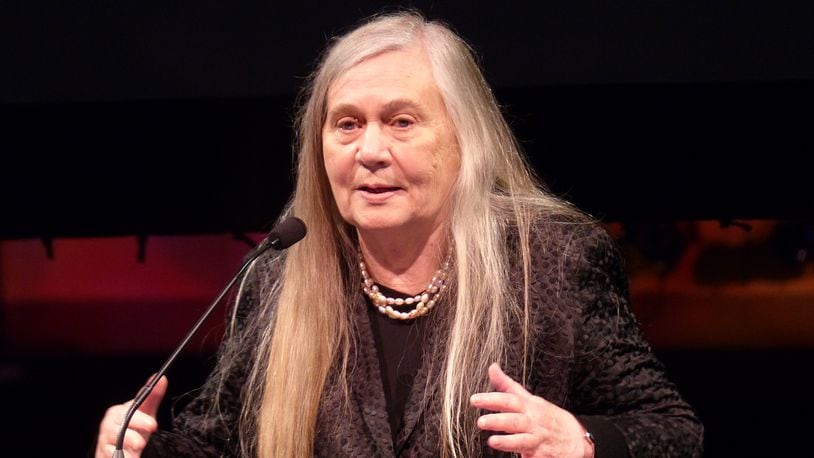Novelist and essayist Marilynne Robinson received the 2016 Richard C. Holbrooke Distinguished Achievement Award. “Lately all the old slurs have arisen again to curse us. They have acquired a new potency,” said the author who was listed by Time Magazine as one of the 100 most influential people in 2016.
Robinson spoke about her 2005 Pulitzer Prize-winning novel “Gilead,” set in the small community of Gilead, Iowa, between the abolitionist and civil rights movements. In researching the history of Iowa, she said, “I found a history of profound social reform shared widely throughout the region, notably in Ohio. I found integration of every kind before the Civil War supported by laws, churches and social consensus because settlers had come in the hopes of creating a newly just society.”
But, she continued, the integration “gave way to the norms and laws we call Jim Crow. I have no theory to offer about how this heartbreaking and dishonorable loss was permitted and suffered, so I have no wisdom to offer about how or why such a thing might happen again. I do know that its signature is an especially calloused rudeness directed against the vulnerable under the pretext of the defense of traditional values and with the smugness of assumed majority assent.”
In her remarks before Robinson’s speech, Hungarian-American author and journalist Kati Marton, the widow of Richard C. Holbrooke, said, “Hate spreads much faster than love.”
“It is testing time for our nation,” she added. “Just what do we still stand for? The Dayton Peace Accords that we celebrate tonight cannot survive if nationalists grab power in Bosnia and are encouraged to do so by Moscow, by Belgrade, by possibly Paris, which is also facing elections, and dare I add, Washington. It’s that simple. History is continuous and the world has never been smaller or more vulnerable – at least not since the second World War.”
One of Robinson’s local readers is Pasquale Toscano, who suffered a spinal injury when a motorist struck him on his bicycle in 2013. In recovering from his injuries, Toscano of Kettering read Robinson’s novel, “Home.” “Her story empowered me to fight and walk again,” he said during the reception.
The English student at Washington Lee University in Lexington, Virginia, was recently named a Rhodes Scholar and had the honor of introducing Robinson.
Susan Southard, who received her MFA in creative writing from Antioch University, Los Angeles, accepted the award for nonfiction for “Nagasaki: Life After Nuclear War.” Her book looks at life after nuclear war, as told through five survivors of the Aug. 9, 1945, atomic bombing of Nagasaki, Japan.
After reading selections from her book, Southard said, “I thank you again for this enormous honor, and thank you to the Dayton Literary Peace Prize and all of you here tonight for paying attention to peace.”
Viet Thanh Nguyen received the fiction award for his debut novel “The Sympathizer.” The 2016 Pulitzer Prize winner for fiction, the novel depicts the fall of Saigon through the eyes of a Communist spy who admits he’s “a man of two faces. Perhaps not surprisingly, I am also a man of two minds … able to see any issue from both sides.”
In his acceptance speech, Nguyen said, “It’s the fear of being seen as a traitor that’s also a roadblock to peace, for it’s more comforting to follow our party and to listen only to the like-minded. A commitment to peace is hence much more difficult than a commitment to war. All societies make it easy to commit to war. To commit to peace means one has experienced doubt regarding the things held dear by most of one’s fellow citizens.”
This year’s runners-up are James Hannaham’s novel “Delicious Foods,” about addiction and redemption, and Kennedy Odede and Jessica Posner Odede’s autobiographical love story “Find Me Unafraid.”
Prior years’ honorees Jeff Hobbs, Gilbert King and Anthony Dorr were on hand to introduce the recipients of this year’s awards.
Along with Haygood, King was a keynote speaker Friday during “An Evening for Justice & Peace” at the Victoria Theatre. This was King’s fourth visit to Dayton in conjunction with the DLPP. “”I’m amazed by how people have already read the books,” he said at the reception. “The peace prize has such outreach and awareness. … The people (of Dayton) are your natural resources.”
Feelings of admiration went both ways. “Every year we’re eager to meet the authors and they have never disappointed us,” said DLPP founder and co-chair Sharon Rab during the reception prior to the dinner. “They are insightful, wise, and good and kind.”
Michael and Sandy Bashaw provided musical entertainment during the reception. The Central State University Chorus concluded the evening by singing, “Let There Be Peace on Earth.”
“It was simply breathtaking. Every single presentation,” said first-time attendee Sierra Leone, who serves on the WYSO board. “As a writer, I was inspired to do the work that I’m here to do. I was inspired to read more. I was inspired to appreciate our global connection as Americans.
“The Dayton Literary Peace Prize is a hidden gem so many need to experience — life outside ourselves,” she said.
Belmont High School senior and soccer player Herbert Chongwain, who came to the United States from Cameroon five years ago, was in attendance, along with his fellow teammates. Chongwain was donning a new suit, courtesy of donors of the DLPP. “I’m so, so grateful,” he said. “I’ve never had an experience like this before and I’m so honored.
“Peace brings everyone together as one.”
